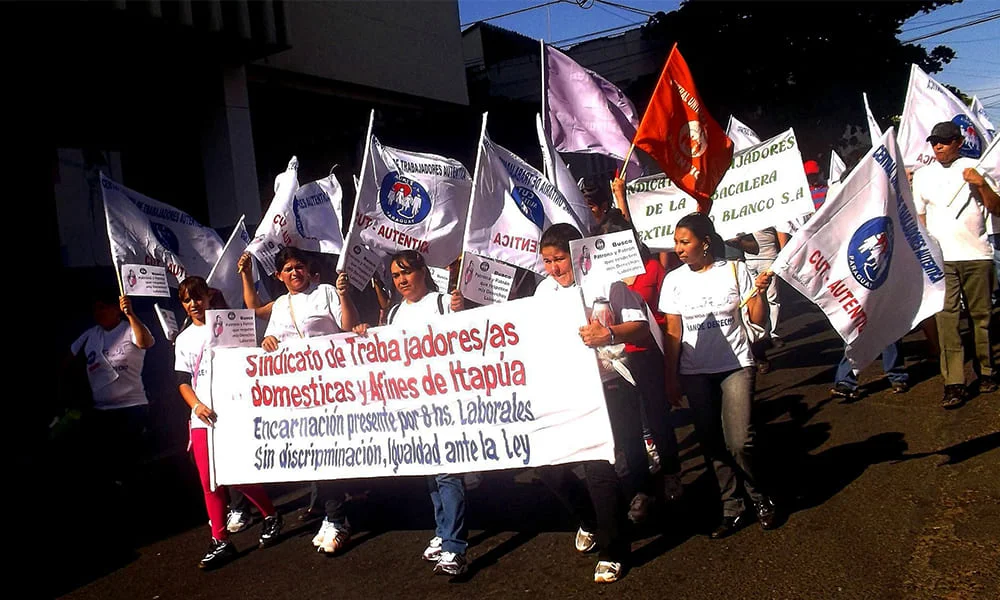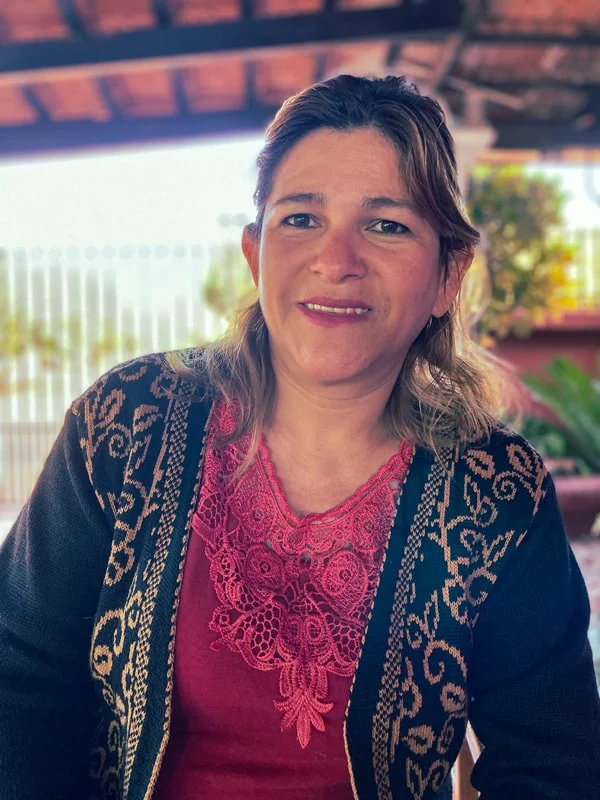
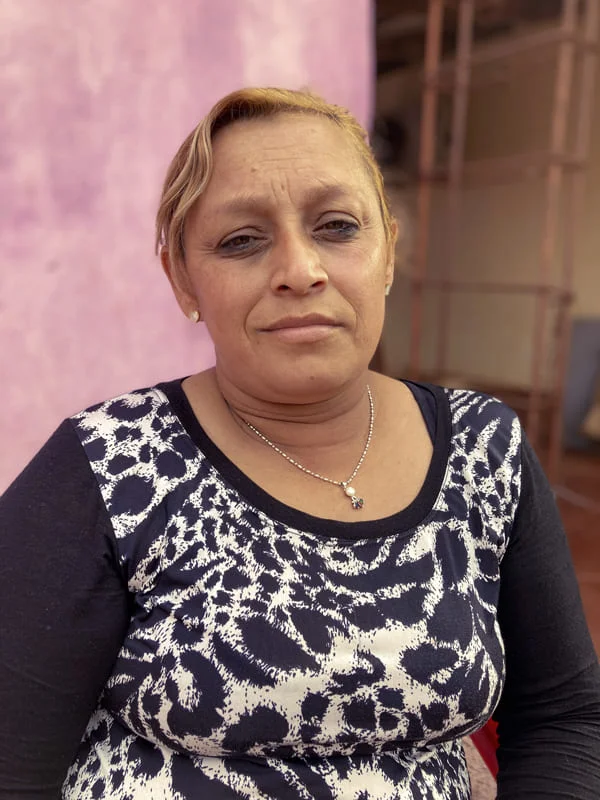
PH: Julieta Gamarra
Librada is currently the reelected General Secretary of the Domestic and Related Workers’ Union of Itapúa (SINTRADI), a pioneer organisation in the organised fight for the rights of domestic workers. Ludi works alongside her as Deputy General Secretary. They can share first-hand what it was like getting Law 6338/2019 on Domestic Work passed, which, after decades of discrimination, finally equates the salary of domestic workers to that of other workers, granting them the right to 100% of the legal minimum wage.
In 2011 they began forming SINTRADI after a training session for domestic workers provided by the International Labour Organization (ILO). Librada’s employer at the time, Isolina Centeno, who worked at the Centre for Multidisciplinary Research for Development (CIMDE), encouraged her to attend the training session and she invited nine other colleagues. “That was when we discovered that there was a domestic workers’ union in Asunción,” recalls Librada. Determined to establish a regional union, Librada summoned more women to a new series of training sessions in conjunction with other organisations, and on January 8, 2012 they officially founded SINTRADI. Ludi was her neighbour and was one of the first to join the new organisation. “I had no idea that I had rights as a domestic worker, nor that we could unionise. Librada invited me to the workshops, to the training sessions, and that’s when I found out,” explains Ludi.
Librada states that, even before the formal creation of the union, they had already begun organising themselves to fight. At that time, they sought to get ILO Convention 189 on domestic workers approved. During this process, Librada had the opportunity to travel to Geneva. Thanks to effective lobbying, Paraguay ratified the convention that establishes the protection of the rights of those who perform domestic work, including equal pay. Shortly afterwards, SINTRADI, in conjunction with the Trade Union of Domestic Workers of Paraguay (SINTRADOP), the Association of Domestic Service Employees (ADESP) and with the support of civil society organisations, the ILO and the United Nations Agency, worked on what would later become Law 5407/2015 on Domestic Work. In the case of SINTRADI, Librada and Ludi particularly acknowledge the support received from the Centre for Documentation and Studies and the lawyer Marcella Zub Centeno while drafting the law at the local level.
“We travelled to Asunción every Saturday,” recalls Librada. “We achieved progress on issues such as retirement, the eight-hour day, but they limited our salary to 60% of the minimum. Before this law, it was only 40%.” That was in 2015, when they were still four years away from achieving salaries equivalent to 100% of the minimum wage.
The process took a high toll for many colleagues. “Many lost their jobs because employers did not agree with their unionisation and fired them,” reveals Librada. Ludi was one of them and she also faced family difficulties due to the frequent and extended trips. Today she has the support of her husband and her sons and daughters. Despite the difficulties, nothing could hold them back: “We kept fighting, we didn’t give up, that was the most beautiful thing.” Everyone felt that they had made a commitment and that they should push forward.
In 2016, Librada emigrated to Buenos Aires, Argentina, for work, a common practice given the prospect of better wages and more dignified working conditions. For two years, the union was essentially inactive and several members asked her to return. Therefore, Librada made a decision: “If the minimum wage is granted, I’ll stay in Paraguay. I came back willing to give it my best, I fought, I fought so much with senators, with members of parliament; they discriminated against us, they insulted us… why did we want a minimum wage if we couldn’t read.”
These unjust moments are reflected in Librada’s determined gaze: “I told them that I needed that salary because I had to emigrate, leave my four children who are now grown up thankfully, but that I was still fighting for other domestic workers so that they could have their retirement fund, so they are not forced to leave their families. Many made fun of us, they insulted us, others avoided us, they did not want to see us. On the other hand, we also received the support of various other parliamentarians. But nobody gave us anything for free, we fought hard. There are some comments that mark you for life.”
Lobbying took place in the hallways, in meetings, and they had to have a well-defined and persistent strategy. At the same time, other sectors advocated for modifications to the law that disadvantaged female domestic workers. Ludi remembers: “Sometimes they wouldn’t say certain things to our faces, but then we would hear them during the debates. This made us so angry, but also gave us strength because there were others who defended our stance.”
Public opinion was divided and the opposing positions revealed a stark reality that the members of SINTRADI were always aware of: domestic work is not valued as it should be, and in Paraguay domestic workers are considered second-class workers, with fewer rights and less opportunities. Gender and class biases intersect to create structural discrimination that normalises low wages, work overload, precariousness and informalisation of female domestic workers, and even mistreatment and abuse.
Law 6338/2019 was finally approved in June 2019. It modified the law passed in 2015 and included the right to 100% of the minimum wage. Ludi recalls that her first reaction, after joy, was surprise. “We heard so many arguments against us that it seemed impossible for it to be approved. At that moment, I couldn’t believe it,” she says.
Despite this enormous achievement, the struggle continues: just as many employers immediately complied with the provisions, others do not comply with the law and take advantage of the women’s need for work. That is why SINTRADI also aims to provide information, raise awareness and train female domestic workers, whether they belong to the union or not.
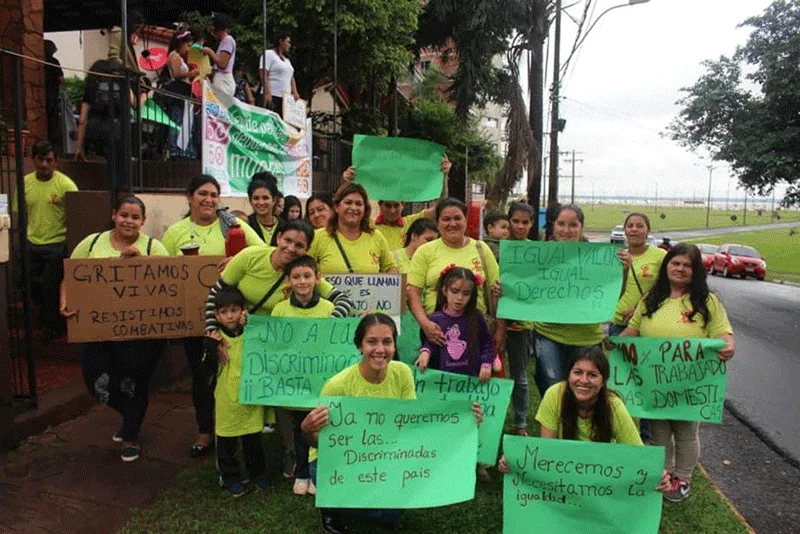
PH: Sintradi
COMMUNICATION WITH A RIGHTS PERSPECTIVE
Two years ago, the opportunity arose for SINTRADI to do a radio programme as part of a Solidarity Center project. Celina Barrios (25) is one of Librada’s daughters and also a founding member of the union. She explains that when they heard the proposal, “we thought they were going to have professional hosts and that we were going to help behind the scenes, but they explained that was not the case, we would be the show hosts.”
Before starting to broadcast, they received training about working in radio and TV and established a team of four to six that agreed to rotate from programme to programme. That is how La Hormiguera started. It is broadcast weekly on radio and TV and can also be seen on SINTRADI’s Facebook page. Celina is mainly in charge of interviews. As part of each show they invite a specialised professional, such as a psychologist or a lawyer. “I like doing the show, I feel we all work together and there is trust amongst the team. Over time we’ve improved a lot, things flow better,” says Celina.
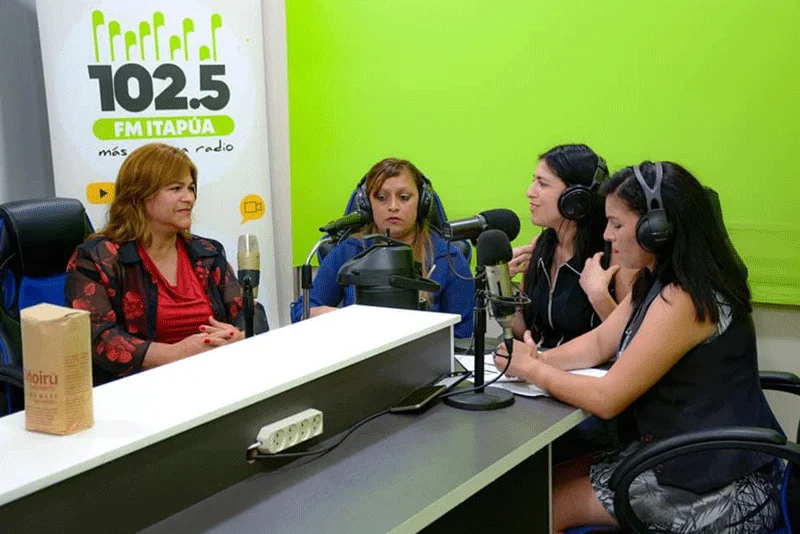
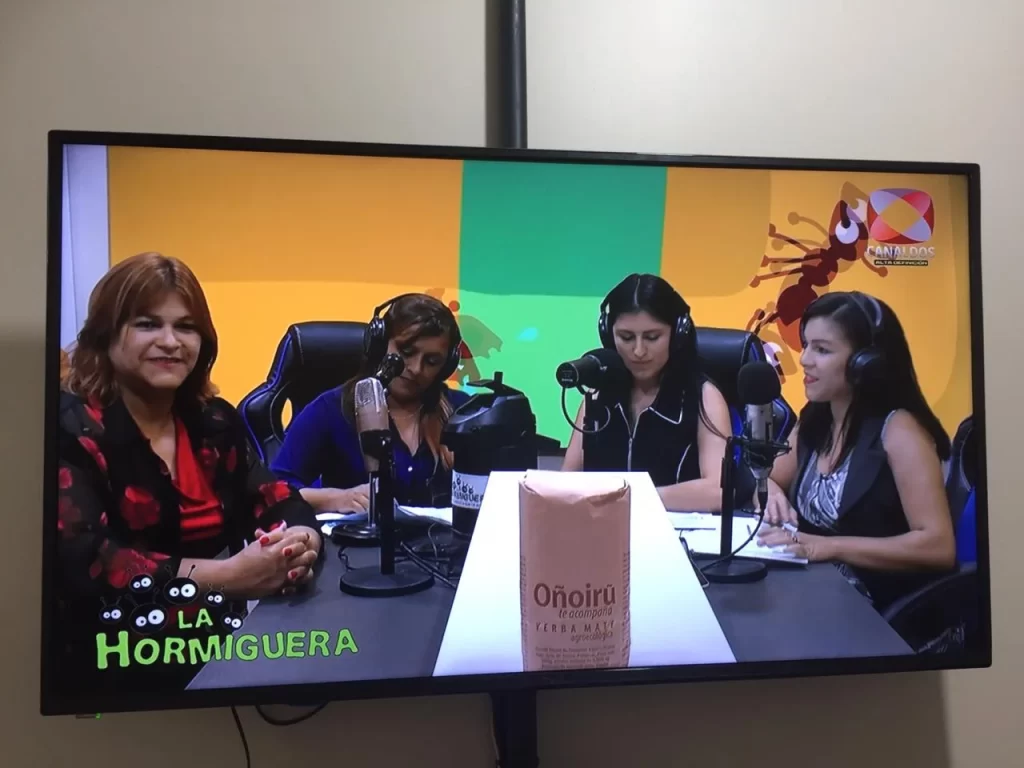
PH: Sintradi
The programme was conceived as a tool for dissemination, debate and training. Many women learn about SINTRADI through the programme and contact the team asking for more information to join the union. Recently, they launched a new segment in which they cover articles of the Domestic Work Law, hoping to clarify doubts about the different modifications that were made and so that listeners know how it protects them.
“We were afraid we’d come up against viewers and listeners opposed to the programme,” says Celina, “because domestic workers never had a voice and, suddenly, we were on a well-known channel in the city talking about laws, about rights. But we receive very positive comments and that gives us strength.”
La Hormiguera became a platform for sharing knowledge, pooling resources, and demonstrating their collaborative and autonomous work. It delivers an alternative voice to strengthen the rights of domestic workers.
COVID-19 AND JOB INSECURITY
The streets of the Commercial Circuit of the city of Encarnación have been quiet and almost empty for more than a year. With the outbreak of COVID-19 and the consequent preventative measures, hundreds of businesses were closed and those that managed to stay open have reduced their staff to the bare minimum.
Hotels, bars and restaurants suffered the same fate. With the lack of shoppers from the neighbouring city of Posadas, Argentina, and the economic crisis caused by quarantine, tourism and commerce suffered severely. Women, a clear majority in the employment force in both sectors, were the ones most affected. And, among them, the group most affected is probably that of domestic workers.
During the pandemic, SINTRADI did not receive any institutional, local or national support. Within the framework of projects implemented with organisations such as Fondo de Mujeres del Sur and the International Domestic Workers Federation (IDWF), of which they are founding members, they organised activities and raised money to create food packages to distribute and organise community soup kitchens, one of the most common community solidarity practices during the pandemic and generally promoted by women. “We supported more than two thousand people with the community soup kitchen and we reached more than two hundred families with the food packages,” says Librada.
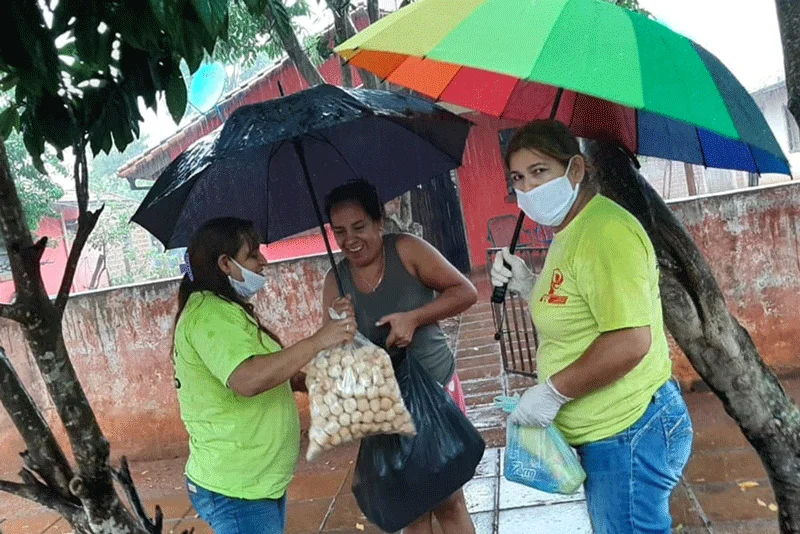
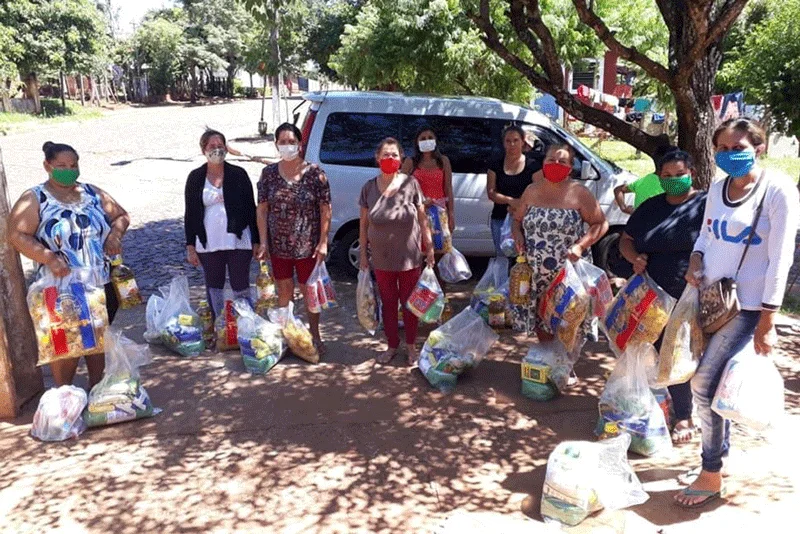
PH: Sintradi
Such organisation was key to alleviating the difficulties that domestic workers were experiencing. “Many of us lost our jobs,” says Ludi, “they cancelled the bus service and we had no way to get around. They also fired us for fear that we would bring the virus into their homes because we use public transport, and almost none of us have our own vehicle. For many their hours were reduced.” According to data from the investigation “Discrimination against working women in the context of the COVID-19 pandemic,” carried out by Kuña Róga and the Central Unitaria de Trabajadores (CUT), 95% of the workers that were dismissed or suspended did not receive compensation because they were not enrolled in the IPS social security system, despite this being a requirement established by the law.
The pandemic also hit them hard with the loss of two colleagues to COVID-19. Victoria and Maximiliana were longstanding union members and actively participated. “I always remember that we organised the last community soup kitchen at Victoria’s house,” says Librada. The death of these colleagues, victims of an absent State, will undoubtedly leave its mark on the heart of the union. The situation continues to be delicate, with many colleagues being affected by the virus.
Thanks to the training they organised, today they have enterprises and run small businesses to sustain their economy. They put together cleaning kits, make handicrafts, sell home-made food and support each other by buying products from each other. Librada has a small grocery store she runs from her house, and she often takes products from the shelves to help another colleague. This solidarity economy continues to be vital to the laid-off domestic workers so they can still provide for their families.
THE DIGNITY OF DOMESTIC WORK
For SINTRADI members, joining the union in many ways became a pivotal moment in their lives. Becoming aware of their rights gave them the tools to assert themselves against the injustices inflicted by society and the Paraguayan State itself.
The cultural component is no minor matter. “In Paraguay domestic work was not valued,” reflects Librada, “it was thought that it should be free, because after all it is a job done by women.” The idea that the employer “has the right to have a domestic worker” is something that SINTRADI seeks to transform, generating the awareness that in order to hire a worker, first of all there has to be respect for their rights. Ludi also states that “domestic work carries with it a great responsibility: someone entrusts you with their house, their children, their food. Such great responsibility must be fairly recognised.”
The training received and, above all, the independence and empowerment that came from organising themselves, transformed the way they perceived themselves. “The union really helped me to be more outspoken, more determined,” explains Ludi, “in our country there is a lot of machismo, we are expected to be subject to men, that’s how they raised us. It was quite a process for me.”
Librada acknowledges feeling proud today of being a domestic worker against an entire socioeconomic system that sought to make them invisible and undermine them. “It is a very valuable and highly sacrificial job. And when I think of everything we have achieved fighting together: there is the proof.”
DREAMS AND PROJECTS
So many things have changed since that meeting in Librada’s house when SINTRADI was formed. The then 33 members are now almost 300, but they aim to reach many more in all the districts of the Itapúa department. Librada hopes to be able to hand over her role as general secretary to someone else: “I like this job and I am honoured by the trust of my colleagues, but I cannot deny that I am very tired. They were many years of struggle, and my family also needs me after so many years of meetings, of trips.”
On the other hand, several members decided to start their university studies. Celina and another colleague, Fátima Garay, will graduate with their law degrees next year, and they hope to support the union in their new role. Librada is in her second year of Social Work after finishing high school in 2016. With regards to this, she highlights that “it is important to get training and an education, domestic work is very nice but we don’t have to do it forever, we can move on, look for other things to do; for example, several colleagues have gone back to finish high school.”
Currently, SINTRADI offers free psychological support and legal advice exclusively for domestic workers in Itapúa, both online and in-person with prior appointment. Shortly, coinciding with the San Juan Ára festival, SINTRADI members will prepare and sell typical meals, as part of their organisation sustainability project within the framework of the Let’s Get It, Sister initiative with support from Fondo de Mujeres del Sur.

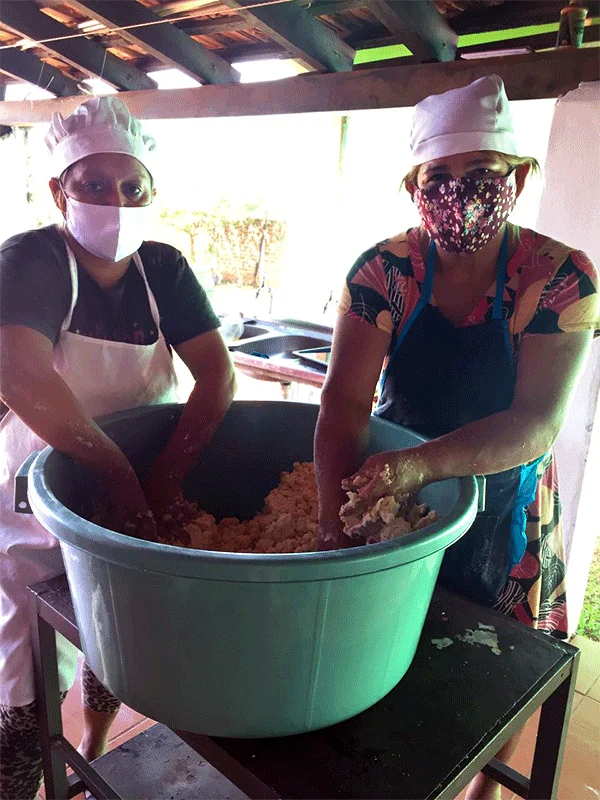

PH: Sintradi
“Fondo de Mujeres del Sur is one of the few organisations that has always supported us,” explains Librada. “They provide us with opportunities and we take them. We don’t miss a beat,” she adds.
Librada, Ludi and Celina agree on a shared dream for SINTRADI: they want to be able to have their own union building, which could be a shelter for workers who come from other districts and also a day care centre for the sons and daughters of domestic workers, whether or not they are members of the union. Looking back at their trajectory of struggle and organisation, it is not hard to believe that this dream could be very close to becoming a reality.
The great debt of society and the State in guaranteeing the rights of domestic workers has still not been fully repaid. Meanwhile, SINTRADI continues to promote their work, encouraging other women to join the union and encouraging them, above all, to have their own voice.
*Julieta Gamarra has a degree in Communications and is a member of Kuña Róga and Universitarias Feministas de Itapúa in Encarnación, Paraguay.

